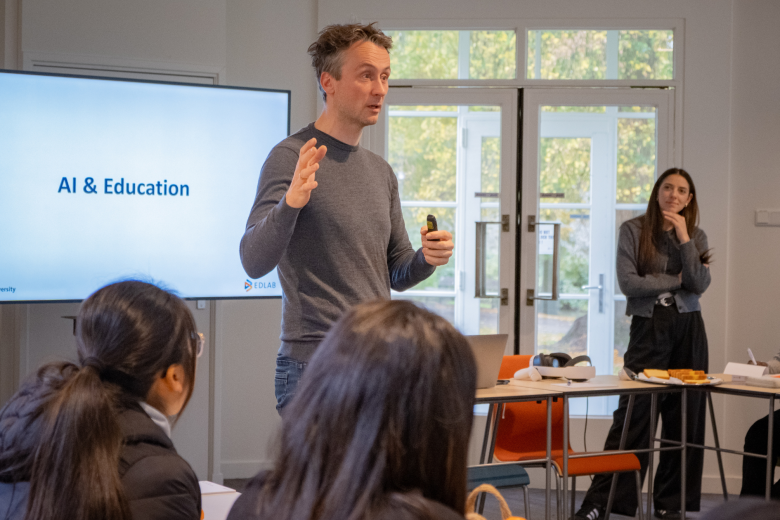Twitter in times of corona: an analysis of business schools' coverage of the pandemic
Perhaps not surprisingly, business school tweets have been awash with content about the COVID-19 pandemic, but it’s not that simple. Analysis by researchers at Maastricht University School of Business and Economics found schools around the world reacted differently to communicating about the pandemic and were largely reactive, waiting for official announcements before making their own contribution.

In 2019 the top four words used were 'business', 'students', 'management' and 'MBA', but the pandemic has changed all that. From the 75503 tweets collected during the last five months (11th of Dec, 2019 – 11th of May, 2020) from EQUIS-accredited business schools 'COVID-19', 'Coronavirus', 'Covid' and 'crisis' were found among the most used terms.
In the last five months, every fourth tweet from business schools has been dedicated to the pandemic. In April alone, African business schools tweeted the most about coronavirus (55% of all tweets of African business schools) followed by Asian and Oceanic business schools (38.9% and 38.4% respectively). Europe, however, still lags behind with only one-fourth of all tweets related to the pandemic.
It’s not only Twitter that is used to communicate with business school stakeholders: email, intranets, and a host of other social media are used as well. However, Twitter is widely used for live updates, be it about breakthrough research or to launch a new course. The key message from all business schools’ Twitter accounts over the past months has, however, switched to 'we are here to help our students and staff overcome the COVID-19 crisis'.
Look more closely and you find that business schools in Oceania and Asia started intense posting about the pandemic at the end of January – beginning of February; European, African, and North- and South-American institutions engaged much later – in mid-March – as a response to government announced obligatory lockdowns. It appears that business schools interact post-factum (after the announcement of the official measures). Skyrocketing in the first week of the lockdown, COVID-19 coverage among business schools tends to stagnate and even decrease in April.
Analysis of words co-occurrences shows that the most commonly used in relation to COVID-19 terms are 'prof', 'professor' and 'webinar', suggesting a strong involvement of business school personnel in coronavirus discussions. The evidence is further supported by the frequent presence of such words as 'impact', 'global', 'social', and 'economic' in business schools’ tweets.
Overall, business schools show a similar pattern of crisis coverage. Engaging rather post-factum (after the official announcement of measures), they share with their audience COVID-19 key topics, advances and response measures. Many focus on the coronavirus social and economic impact on society as researched by their staff, while others highlight the shift to online learning. Yet, in April, Twitter data shows a negative trend in business schools’ conversations about coronavirus. If the question before was 'aren’t we too late to cover the coronavirus?', now we should rather ask ourselves 'aren’t we too early to suspend it'?
- Click here to view the data used for this article.
This article was written by Olesia Nikulina (researcher at SBE's department of Marketing & Supply Chain Management) and is related to her work with the project 'Futurizing Business Schools'.
Started in 2017, this project uses business schools’ big data (social media, sustainability reports, staff publications) to reveal current and future trends in business education. The findings are integrated into an interactive dashboard aimed to help business schools in their strategic decision-making. Olesia runs the project together with Jos Lemmink and Mian Nguyen.

The research used for this article was prepared in collaboration with Andrew Crisp (CEO of Carrington Crisp).
Also read
-
UWC Maastricht students get a taste of education innovation at EDLAB
On 21 October 2025, EDLAB hosted students from United World College Maastricht for the second year in a row, as part of their Youth Social Entrepreneurship programme.

-
Maastricht University ranked #3 worldwide and #1 in Europe in 2025 Better World MBA Ranking
We are incredibly proud to share that the MBA programmes of Maastricht University School of Business and Economics’ executive branches, MSM and UMIO, have once again been recognised among the very best sustainable business MBA programmes worldwide. In the 2025 Better World MBA Ranking by Corporate...

-
Young people in higher education mainly choose based on their interests. A better link with labour market opportunities is needed.
Against the backdrop of structural labour market shortages, it is of social importance that young people choose courses that not only match their interests and talents but also lead to occupations with good employment prospects and social value, particularly in sectors such as healthcare, education...
